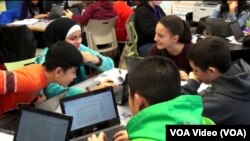Students at New York City’s schools may converse at home in any of the 180 different languages spoken in the city. So when the parent of a school-age child speaks of “a dislocation because of language,” she is referring to a real and complicated problem facing the city’s public schools.
The school system estimates that fully half of the parents of public school students cannot directly communicate with educators to discuss issues concerning their children, which is why it has set up a new translation service for parents who do not speak English as a first language.
The service offers in-school translation and interpretation in nine languages: Arabic, Bengali, Chinese, French, Creole, Korean, Russian, Spanish and Urdu. If parents need help in one of these languages, they can request it from either the school principal or student coordinator.
School chancellor Carmen Farina told a news conference Monday in Chinatown’s Public School 126 that the Department of Education is also offering for the first time direct access to over-the-phone interpreters that working parents can use after 5 p.m.
“We want to make sure that all families will be able to get translation services so that parents in this new year can share language, can share culture,” Farina said.
‘Bridge-building’
Steven Choy, the executive director of the New York Immigration Coalition, called the new service an “outstanding accomplishment for families.” He emphasized, “We must remove all language barriers to better insure the success of immigrant students and their families.”
Co-president of the public school 126 parents’ association, Maria Larios, told the news media and gathered parents that the new initiative will enhance the participation of parents in all aspects of school life.
“Getting involved in a child’s development is critical,” she said.
But Chancellor Farina also foresees a wider effect of the new translation services, what Choy called “bridge-building.”
“We can have greater respect for each other, we need to appreciate each other, and we need to learn from each other,” Farina said. “It is a top priority, and a critical part of building strong relationships between schools and communities.”




